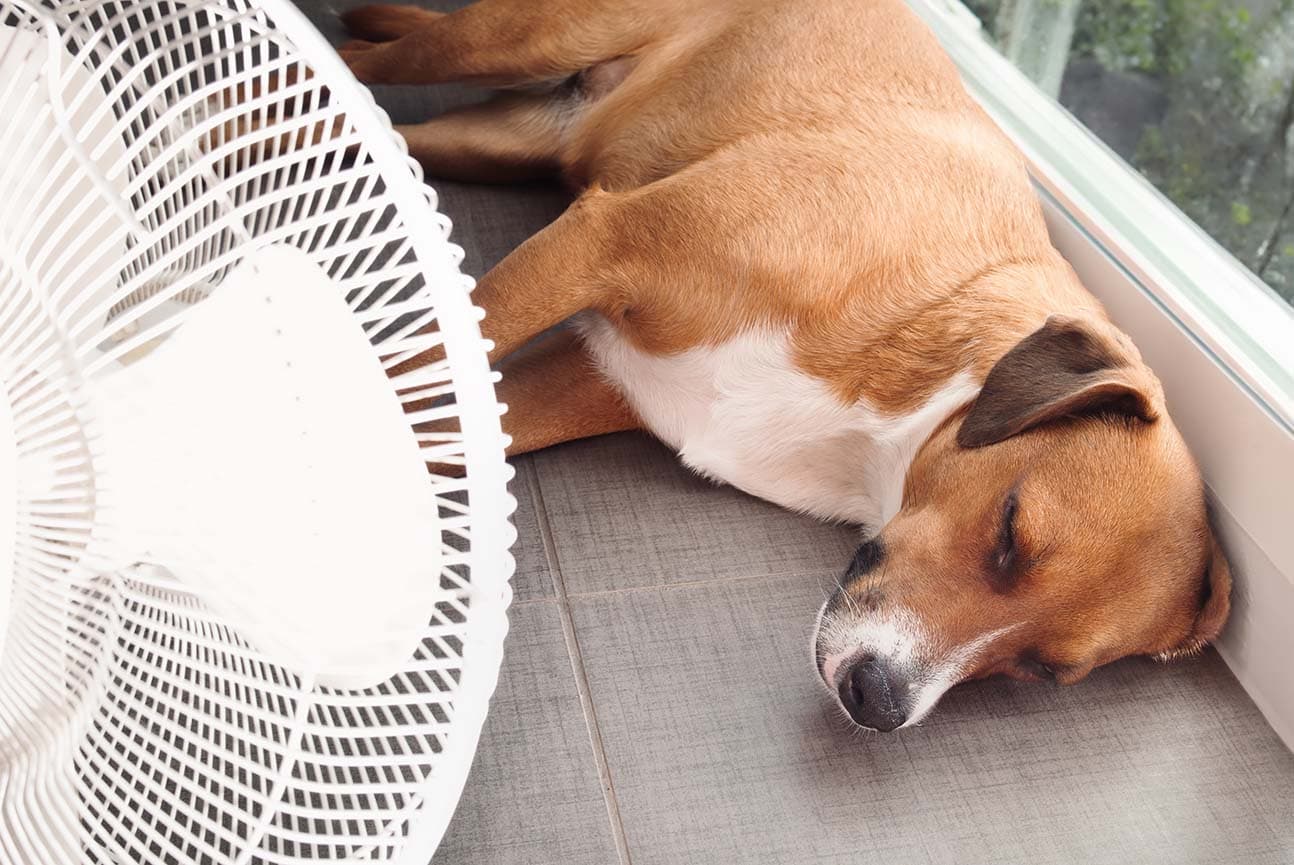Reviewed by Dr. Nicoletta Nica
Updated on 10/10/2025
Reading time 4 min.
Overview
Severity: Low
Life stage: All
Dehydration happens when your dog loses more water than they take in, through panting, urination, vomiting, diarrhoea, or just the dry, hot air of our city. In Dubai, where temperatures regularly soar above 40°C, dehydration is a common and potentially dangerous issue for pets. It can lead to a host of problems, from mild discomfort to life-threatening conditions like heatstroke and organ failure. By understanding the signs and taking proactive measures, you can keep your dog safe and well-hydrated all year round.
What to do if your dog shows signs of dehydration
Stay calm and move your dog to the coolest, most well-ventilated area available immediately, preferably an air-conditioned room. Offer small amounts of fresh, cool water, but don’t force them to drink if they’re reluctant. Contact your veterinarian or emergency animal hospital straight away. In Dubai’s heat, dehydration can progress from mild to severe within hours, so prompt professional assessment is essential.
If your dog has been exposed to extreme heat and you suspect heat stroke alongside dehydration, this is a veterinary emergency.
Common causes of dehydration in dogs
Heat-related causes:
- Extended exposure to Dubai’s extreme outdoor temperatures
- Insufficient access to shade during peak sun hours (10 AM – 4 PM)
- Inadequate air conditioning or ventilation in living spaces
- Hot pavement walks that increase body temperature rapidly
Health-related causes:
- Vomiting and diarrhoea, which are more dangerous in hot climates
- Fever or illness that increases fluid requirements
- Kidney disease affecting the body’s ability to retain water
- Diabetes causing increased urination and thirst
- Certain medications, particularly diuretics
Behavioural and environmental factors:
- Insufficient fresh water availability throughout the day
- Dirty or warm water bowls that dogs refuse to drink from
- Stress or anxiety affecting normal drinking patterns
- Age-related decreased thirst in senior dogs
When to seek immediate veterinary care for dehydration
Take your dog to an emergency vet straight away if:
- Their gums are pale, white, or tacky to the touch
- Your dog is vomiting and cannot keep water down
- Their eyes appear sunken or they seem disoriented
Seek veterinary advice as soon as possible if:
- Your dog hasn’t had any water for more than 4-6 hours in Dubai’s heat
- They’re refusing food and water simultaneously
- You notice a significant decrease in urination
- Your dog seems unusually tired or unresponsive
- Their breathing appears laboured or rapid, even when resting
In Dubai’s climate, what might seem like mild dehydration elsewhere can quickly escalate to a medical emergency.
How to prevent dehydration in dogs in Dubai
Environmental management:
- Ensure constant access to fresh, cool water. Place multiple bowls around your home, both indoors and outdoors in a shaded area. Consider using a ceramic or stainless steel bowl, as these can help keep water cooler for longer. For owners who work long hours, a pet water fountain can encourage your dog to drink more and keep the water fresh.
- Provide ample shade if your dog spends any time outdoors.
Exercise and activity modifications:
- Avoid walking your dog during peak heat. Aim for the early morning or late evening when the temperature has dropped.
- Avoid walking on hot pavement. Always check the ground temperature with the back of your hand; if it’s too hot for you to hold for five seconds, it’s too hot for your dog’s paws.
- Consider dog-friendly swimming options for exercise and cooling.
- Always carry water and a portable bowl during any outdoor activities.
- Use hydrating treats. Frozen watermelon (seedless), cucumber slices, or pet-safe ice cubes can be a great way to increase water intake.
Home environment:
- Maintain comfortable indoor temperatures with reliable air conditioning.
- Ensure good ventilation in all areas your dog accesses.
- Consider cooling mats or fans for additional comfort.
- Monitor humidity levels, as high humidity makes cooling more difficult.
Special considerations for Dubai:
- Gradually acclimate newly arrived dogs to the climate over several weeks.
- Be extra vigilant during sandstorms, which can increase dehydration risk.
- Stock up on supplies before extreme weather warnings.
- Monitor high-risk pets. Puppies, senior dogs, brachycephalic breeds and those with health conditions need closer supervision on hot days.
Recognising the signs of dehydration in dogs
Normal hydration means your dog should have moist gums, bright eyes, and elastic skin. They should be urinating regularly and maintaining normal energy levels.
Early signs of dehydration:
- Slightly tacky or sticky gums instead of being wet and slippery
- Decreased appetite or interest in activities
- Less frequent urination or darker yellow urine
- Mild lethargy, especially in normally active dogs
Moderate to severe dehydration symptoms:
- Gently lift the skin on the back of your dog’s neck or between their shoulder blades. In a well-hydrated dog, the skin should snap back immediately. If it takes more than a second or two, your dog may be dehydrated
- Dry, pale, or white gums
- Excessive panting and rapid breathing, especially if not linked to exercise
- Sunken eyes or a dull expression
- Weakness or unwillingness to move
Dogs typically need approximately 50-100ml of water per kilogram of body weight daily, but in Dubai’s heat, this requirement can double or triple.
Home care for mild dehydration
If your dog shows mild signs of dehydration:
- Offer small amounts of fresh, cool water every 15-30 minutes
- Provide ice cubes for some dogs who prefer to lick rather than drink
- Offer hydrating treats, such as cucumber slices or cubes of seasoning-free frozen broth
- Move them to the coolest area of your home immediately
- Offer a dog-appropriate electrolyte replacement solution. Never give your dog human electrolyte drinks, as they often contain xylitol or other ingredients toxic to dogs.
If your dog is vomiting, lethargic, or showing any concerning symptoms, home treatment is not appropriate. In Dubai’s climate, dehydration can become critical quickly, and professional veterinary care is essential.
Vet treatment for dehydration in dogs
Emergency stabilisation:
- Intravenous (IV) fluid therapy is the most effective treatment for moderate to severe dehydration
- Subcutaneous fluid administration for milder cases
- Electrolyte balance correction
- Temperature regulation support if heat stroke is concurrent
Diagnostic procedures:
- Blood tests to assess kidney function and electrolyte levels
- Assessment of the underlying cause of dehydration
- Monitoring of heart rate and blood pressure
- Ongoing evaluation of hydration status
Ongoing care:
- Gradual rehydration over several hours to avoid overwhelming the system
- Monitoring for complications such as kidney damage
- Treatment of any underlying conditions contributing to dehydration
- Nutritional support if needed
- Extended monitoring may be necessary due to the increased risk in local climate conditions
Is your dog at higher risk for dehydration?
High-risk breeds:
- Brachycephalic (flat-faced) breeds: Bulldogs, Pugs, Boston Terriers
- Dogs with thick, double coats: Huskies, German Shepherds, Golden Retrievers
- Large breed dogs who generate more body heat
- Black or dark-coloured dogs who absorb more heat from the sun
Age-related factors:
- Puppies and senior dogs (over 7 years) have less efficient temperature regulation
- Elderly dogs may have underlying health conditions affecting hydration
- Very young puppies haven’t yet developed full heat tolerance
Health conditions increasing risk:
- Kidney disease or diabetes
- Heart conditions
- Previous episodes of heat stroke
- Obesity, which impairs cooling ability
- Dogs on certain medications
Lifestyle factors:
- Recently relocated dogs still adjusting to Dubai’s climate
- Working dogs or those with high activity levels
- Dogs left in cars, even briefly (never acceptable in Dubai)
- Outdoor living situations without adequate shelter
Concerned About Dehydration?
If you’re worried your dog may be dehydrated, don’t wait. Book a check-up or emergency appointment today at Modern Vet Hospital in Dubai. Our experienced team offers diagnostic services, emergency treatment, and ongoing care tailored to your pet’s needs. Whether it’s a routine hydration check or urgent care, Modern Vet Hospital is your trusted veterinary clinic in Dubai for compassionate, expert support.
Share this, choose your platform!
Reviewed by
Dr. Nicoletta Nica
DVM MRCVS
Dr. Nicoletta was born in Romania and studied veterinary medicine in Timisoara.After graduation Dr. Nicoletta remained in Timisoara, and worked for a small animal clinic.


